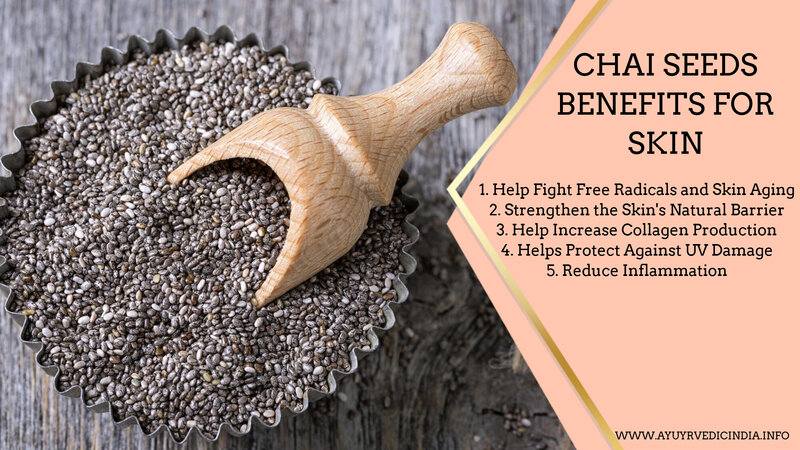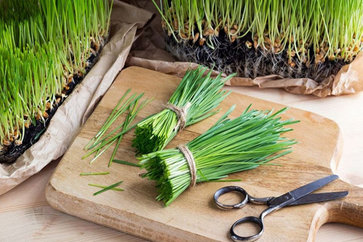Chia Seeds Benefits For Skin: Nourishing Your Complexion Inside Out
Chia seeds are small grains that pack a powerful punch when it comes to their benefits for the skin. They are rich in antioxidant and anti-aging properties, which can help bring back the lost glow of your skin.

These magical seeds offer numerous benefits for both your overall health and your skin. Here are some of the benefits of chia seeds and how to incorporate them into your skincare routine:
1. Glowing and Soft Skin
Chia seeds are known for their ability to nourish and moisturize the skin. The antioxidants, vitamins, and minerals present in chia seeds work together to hydrate the skin, promote elasticity, and enhance its natural radiance.
By consuming chia seeds and applying them topically on your face, you can achieve glowing and soft skin.
2. Anti-Aging Effects
The anti-aging properties of chia seeds can help in reducing the appearance of wrinkles and fine lines. They are packed with antioxidants that combat free radicals, which are known to contribute to premature aging.
Regular consumption of chia seeds and using them as part of your skincare routine can help keep your skin youthful and beautiful.
3. Nutrient-Rich Superfood
Chia seeds are a powerhouse of nutrients. They are loaded with omega-3 fatty acids, fiber, protein, calcium, magnesium, and various vitamins and minerals.
These nutrients are essential for maintaining overall health and can have a positive impact on your skin as well. Incorporating chia seeds into your diet can provide your body with the necessary nutrients to support healthy skin.
Chia Seeds Benefits For Skin
To make the most of the benefits of chia seeds for your skin, here’s how you can use them:
1. Topical Application
Create a chia seed face mask by mixing ground chia seeds with a small amount of water or other natural ingredients like honey or yogurt.
Apply the mixture to your face and leave it on for about 15 minutes before rinsing off with warm water. This mask can help moisturize and rejuvenate your skin.
2. Dietary Incorporation
Add chia seeds to your daily diet for internal nourishment. You can sprinkle them on your breakfast cereals, yogurt, or salads. Chia seeds can also be used as an egg substitute in vegan baking recipes.
By consuming chia seeds regularly, you can benefit from their nutritional properties and support your skin health from within.
Remember to consult with a healthcare professional or dermatologist if you have any specific skin concerns or allergies before incorporating new ingredients into your skincare routine.
Nutrients Found In Chia Seeds
Chia seeds, scientifically known as Salvia Hispanica, are nutrient-dense grains that are not native to India and are typically imported from other countries.
Despite their small size, chia seeds are a powerhouse of nutrients and possess various medicinal properties. Here are some of the key nutrients found in chia seeds:
1. Omega-3 Fatty Acids: Chia seeds are one of the best plant-based sources of omega-3 fatty acids. These essential fatty acids play a crucial role in supporting heart health, reducing inflammation, and promoting brain function.
2. Protein: Chia seeds are an excellent source of plant-based protein, making them a valuable addition to vegetarian or vegan diets. Protein is essential for tissue repair, muscle growth, and the production of enzymes and hormones in the body.
3. Zinc and Copper: Chia seeds contain essential minerals like zinc and copper. Zinc is important for immune function, wound healing, and maintaining healthy skin. Copper is involved in the production of collagen, which promotes skin elasticity and helps prevent signs of aging.
4. Omega-6 Fatty Acids: Chia seeds also provide omega-6 fatty acids, which are necessary for maintaining overall health. These fatty acids play a role in regulating metabolism, supporting brain function, and promoting healthy skin.
5. Potassium: Chia seeds are a good source of potassium, an electrolyte that helps maintain proper fluid balance, supports nerve function, and aids in muscle contractions.
6. Fiber: Chia seeds are rich in dietary fiber, both soluble and insoluble. Fiber promotes healthy digestion, aids in weight management, and helps regulate blood sugar levels.
7. Other Nutrients: Chia seeds also contain carbohydrates, fats, sodium, phosphorus, calcium, manganese, and various vitamins such as vitamin A, vitamin E, and B-complex vitamins.
In addition to their nutritional value, chia seeds possess antifungal and antioxidant properties. The antifungal properties can help combat skin-related issues caused by fungal infections, while antioxidants protect the skin from damage caused by free radicals, promoting healthier and younger-looking skin.
It’s important to note that while chia seeds offer many health benefits, they should be consumed as part of a balanced diet and not as a sole source of nutrition. It’s always a good idea to consult with a healthcare professional or nutritionist for personalized dietary advice.
What Do Doctors Say About Chia Seeds?
Chia seeds benefits for skin are amazing, according to Dr. Anurag Arya, Secretary of the Indian Association of Dermatologists, Venereologists, and Leprologists in Meerut, chia seeds offer significant benefits for the skin. Dr. Arya explains that apart from including chia seeds in your diet, they can also be directly applied to the skin, with chia seed oil being particularly beneficial.
1. Chia seed oil is rich in omega-3 fatty acids: Specifically alpha-linolenic acid (ALA), as well as omega-6 fatty acid linoleic acid. These essential fatty acids play a crucial role in maintaining the moisture of the skin. Dry and lifeless skin is often prone to itching and rashes, and the use of chia seed oil can help alleviate these conditions.
2. The moisture-retaining properties: Chia seed oil can help hydrate the skin, making it more supple and preventing dryness. By maintaining proper hydration levels, chia seed oil can contribute to a healthier and more vibrant complexion. Additionally, hydrated skin is less prone to itching and irritation, reducing the chances of developing rashes or other skin-related problems.
3. Provide a protective barrier: Using chia seed oil directly on the skin can provide a protective barrier that locks in moisture and shields the skin from environmental factors that may contribute to dryness or damage. This protective effect helps in maintaining the skin’s natural barrier function, preventing moisture loss and promoting overall skin health.
Note:
It is worth noting that chia seed oil can be used as part of a skincare routine, but individual results may vary. If you have specific skin concerns or conditions, it is advisable to consult with a dermatologist or skincare professional for personalized advice on how to incorporate chia seed oil into your skincare regimen effectively.
Overall, the omega-3 and omega-6 fatty acids present in chia seeds, particularly in chia seed oil, can help maintain skin moisture and combat dryness, contributing to healthier and more comfortable skin.
How To Use Chia Seeds For Skin Benefits?
The benefits of chia seeds for the skin are plentiful. Here are two key advantages of incorporating chia seeds into your skincare routine:
1. Skin Glow
Chia seeds are rich in essential nutrients like vitamin C, vitamin A, folate, iron, and potassium, all of which contribute to the maintenance of skin beauty.
Regular consumption of chia seeds can help your skin stay glowing and radiant. You can also create a chia seed mask to apply directly to your skin.
How to Use
Soak the seeds in water for some time and then mix them with olive oil or honey to form a mask. Apply this mask not only on your face but also on your entire body for a nourishing and rejuvenating effect.
2. Hydration
Chia seeds contain a significant amount of fiber, which has the ability to absorb a considerable amount of water. This hydrating property makes chia seeds beneficial for maintaining skin hydration.
Additionally, the fiber present in chia seeds promotes a healthy digestive system, preventing issues like constipation and indigestion. A healthy stomach is crucial for maintaining healthy skin.
How to Use
To utilize chia seeds for skin hydration, you can create a chia seed gel by soaking the seeds in water. Apply this gel on your skin every night before going to bed to keep your skin hydrated. The vitamins present in chia seeds also contribute to maintaining the natural glow of your skin.
3. Repair and Protection
The antioxidant properties of chia seeds are beneficial for repairing skin damage and protecting it from harmful free radicals.
Additionally, the omega-3 fatty acids present in chia seeds help protect the skin from the damaging effects of UV rays from the sun. Chia seeds can be effective in reducing the appearance of wrinkles and fine lines, making the skin look more youthful.
How to use
To utilize the benefits of chia seeds for protection against sun damage, you can use the chia seed gel as a natural sunscreen.
Apply the gel on your skin before stepping out in the sun to provide a protective barrier against harmful UV rays and external pollutants like dust and dirt. This can help safeguard your skin and prevent damage caused by sun exposure.
4. Reduction of Facial Swelling
Chia seeds possess anti-inflammatory properties, which can be effective in reducing skin inflammation. The cooling effect of chia seeds makes them particularly beneficial for addressing issues related to inflammation. Using chia seeds on your skin during the summer season can help cool and soothe the skin, promoting a healthy and smooth complexion.
How to use
To reduce facial swelling and inflammation, you can incorporate chia seeds into your daily diet by consuming them regularly in the morning.
Additionally, you can create a paste using chia seeds and apply it to your entire body before taking a bath. This can provide a soothing effect on the skin and help alleviate inflammation.
Note:
It’s important to note that while chia seeds offer potential benefits for the skin, individual results may vary. It’s recommended to consult with a healthcare professional or dermatologist for personalized advice on incorporating chia seeds into your skincare routine effectively.
Additionally, if you have any allergies or sensitivities, it’s crucial to perform a patch test before applying chia seed-based products to your skin to ensure compatibility.

























